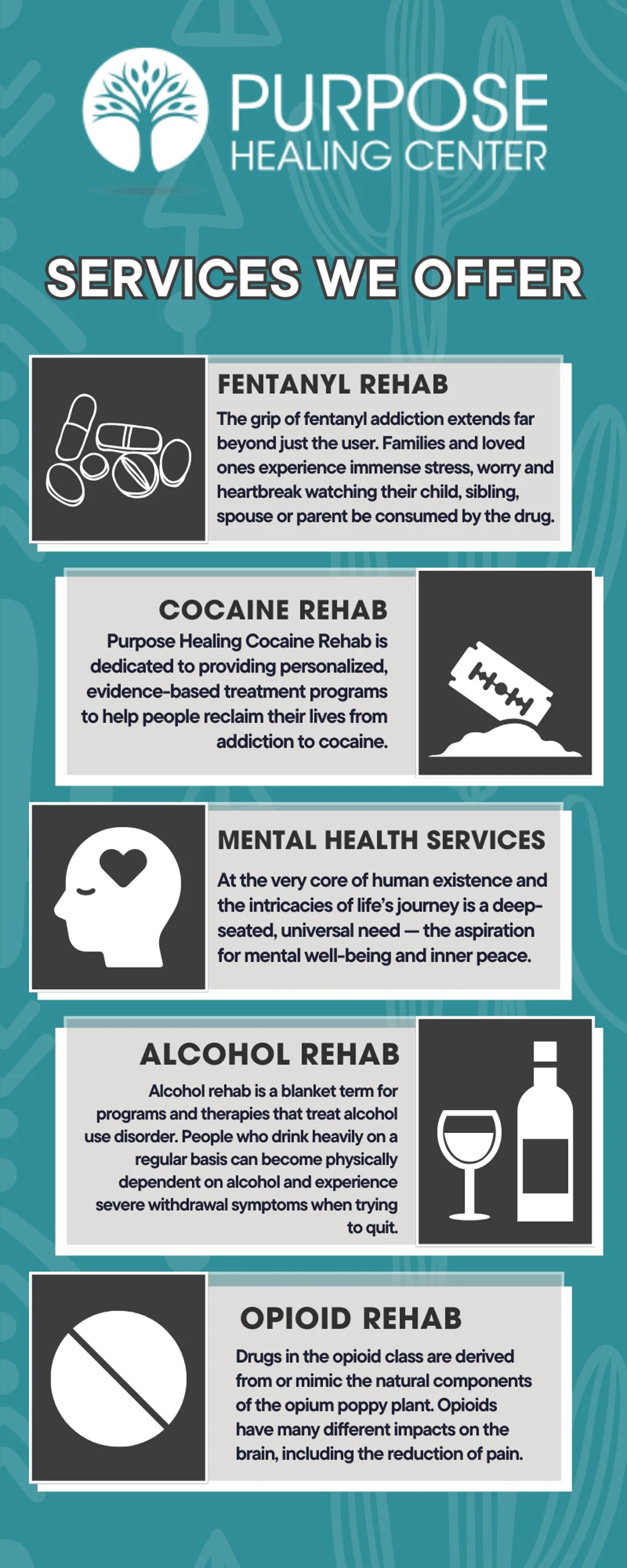Drug Treatment Programs
Choosing a treatment program is one of the biggest decisions you’ll face when you or your loved one is ready to recover from addiction. Purpose Healing Center offers a variety of treatment programs and our admissions staff can help you choose which programs fit best with your lifestyle and recovery needs.
Here’s a closer look at inpatient versus outpatient treatment, so you can make an informed decision surrounding your addiction recovery.
What Is Inpatient Rehab?
Inpatient Residential programs are the most intensive live-in programs that offer 24-hour care and support. These programs are highly structured and help you or a loved one adjust to a healthier, sober lifestyle without drugs and alcohol. Drug detox and alcohol detox are normally included with these programs, as well as therapies that help you change behaviors and thought-processes contributing to your substance use disorder.
Inpatient and residential programs are nearly identical to one another, except inpatient programs are geared more toward those who require intensive medical care and monitoring due to co-occurring medical conditions or mental health disorders.
Get Accredited Treatment Programs at Purpose
What Are the Benefits of Inpatient Drug Rehab?
Inpatient drug rehab separates you from triggers, people who are negative influences, and environments that may have been unsafe, stressful, or detrimental to your recovery. Inpatient rehab also separates you from drugs and alcohol, as well as daily stressors and everyday responsibilities that may distract you from treatment.
Other benefits of inpatient rehab include:
- Access to 24-hour medical staff and support systems
- The ability to withdraw from drugs and alcohol in a quiet, relaxing environment
- A busy schedule that keeps your mind off drug and alcohol use
- Therapies and therapeutic activities that promote your recovery and well-being
- The opportunity to meet and spend time with peers in recovery
- Access to quality amenities and nutritious gourmet meals
- Daily housekeeping and laundry services
Every inpatient program offers its own unique perks and amenities that support a healthy, long-term recovery from addiction.
What Is Outpatient Rehab?
Outpatient rehab programs such as our PHP and Intensive Outpatient Programs meet for a set number of hours every day or week and are structured around your personal life. These programs take place in an outpatient setting at a community center, drug rehab center, or clinic where you can receive therapy and attend regular support group meetings. Outpatient rehab is the lowest level of care and helps patients stay connected with the recovery community after becoming abstinent from drugs and alcohol. Many patients in outpatient programs have already gone through drug detox and recovered from physical drug and alcohol dependence.
What Are the Benefits of Outpatient Drug Rehab?
Outpatient rehab gives you the freedom to go to work or school as you continue recovering from addiction. Outpatient rehab also allows you to live at home so you can care for your family and manage other important responsibilities.
Other benefits of outpatient rehab include:
- The option to choose day treatment or night treatment
- The ability to advance in work or school while continuing to receive treatment
- Adjustment to life outside of rehab as a sober individual
- Lower treatment costs
Many outpatient rehab centers will work around your busy schedule and may also include vocational training and ongoing substance abuse education.
We Accept Most Major Insurances
Choosing Between Inpatient and Outpatient Rehab
Which drug or alcohol rehab program is best for you? If you’re not sure, our treatment consultants can help you choose the right program. During the pre-assessment, our staff will perform an assessment to determine the level of care you may need to experience a lasting recovery from addiction.
The initial assessment consists of an interview to help staff learn more about you and your substance use disorder, and about the services and treatments you may need. For instance, if you’re helping a loved one who is addicted to methamphetamine and on the verge of experiencing a psychotic episode, the admissions team may recommend that your loved one join an inpatient program so they can receive 24-hour monitoring and medical care, and withdraw in a safe, controlled environment.
Inpatient rehab is highly beneficial to those who need help establishing daily structure and adjusting to life without drugs and alcohol. Inpatient rehab may also benefit those who need medical detox to withdraw from highly addictive substances such as alcohol and heroin. Outpatient rehab is ideal for those who are motivated to stay sober but who do not require 24-hour monitoring, and who have already completed an inpatient rehab program.
Up To 100% of Rehab Costs Covered By Insurance
Purpose Healing Center offers medical drug detox, inpatient rehab, and a range of other treatment programs that are personalized to help you experience a long-lasting recovery from addiction. Contact us today at 480-579-3319 to begin the admissions and treatment process.


